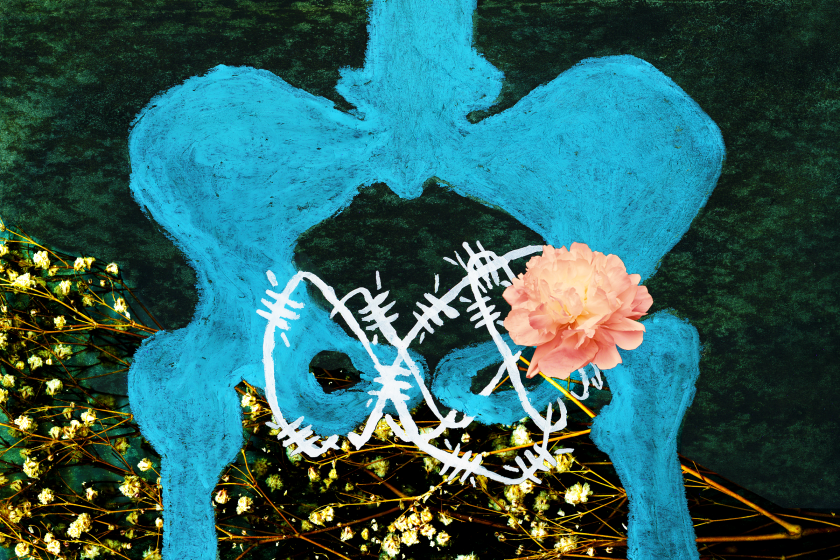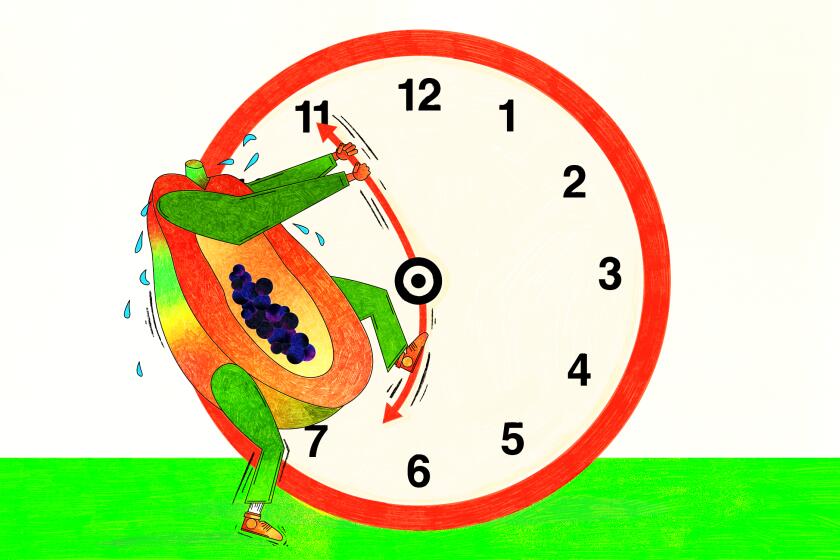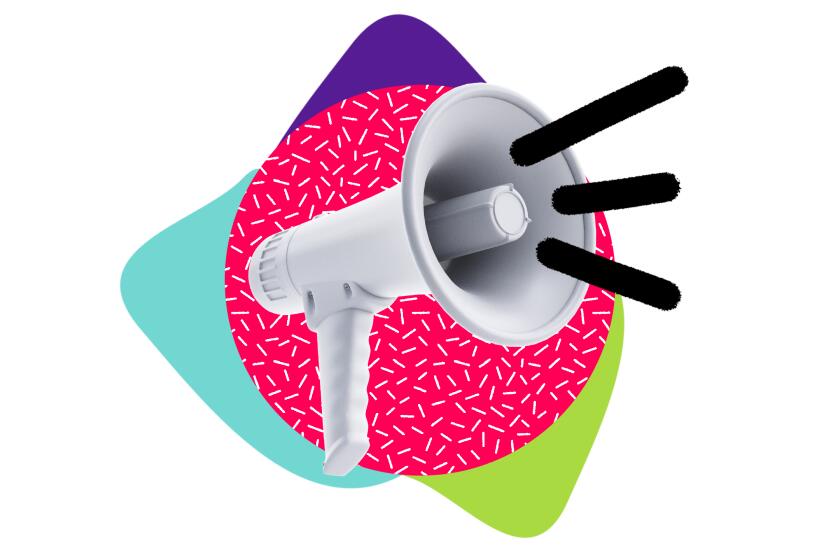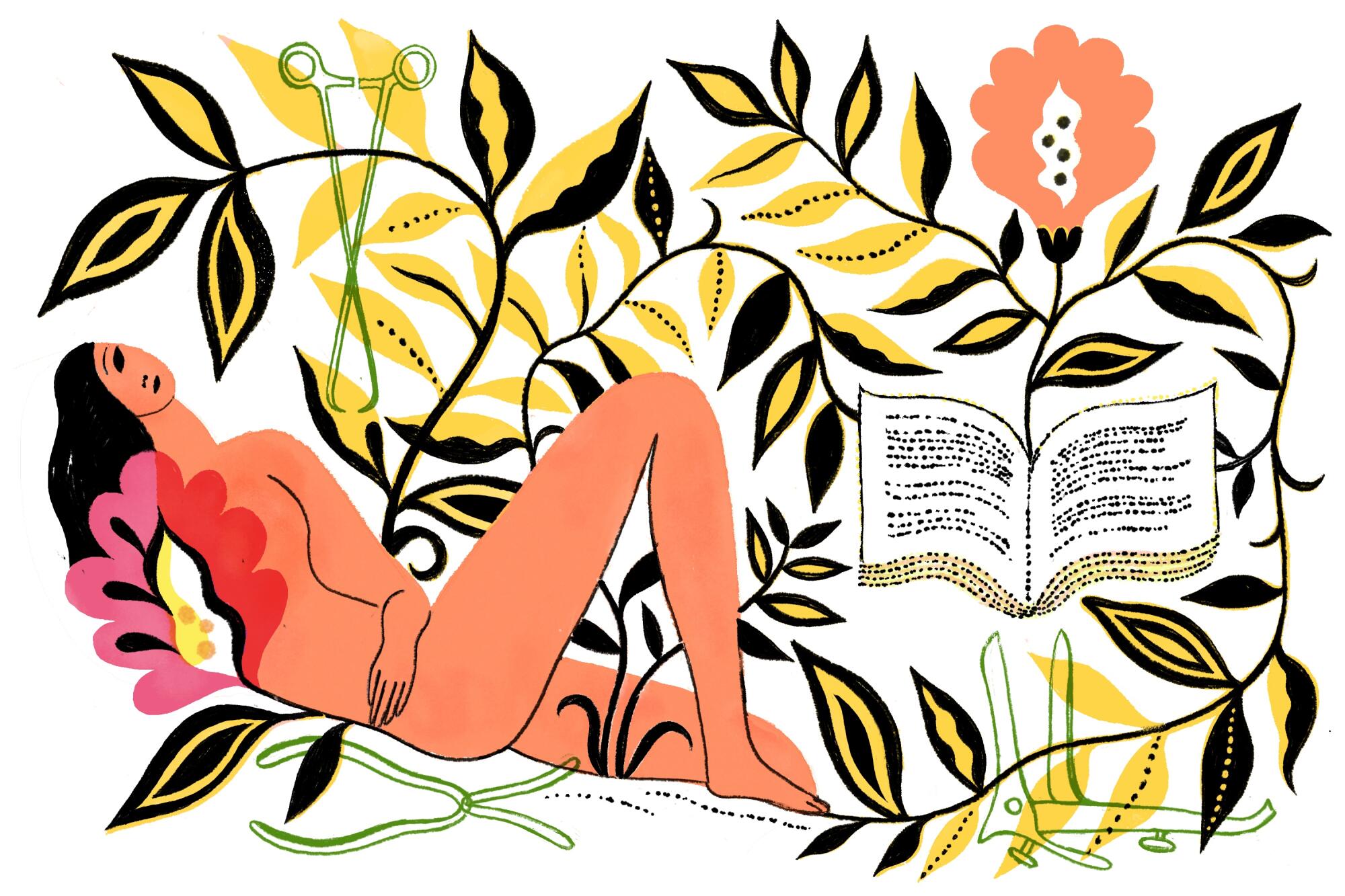
- Share via
One night as she was lying in bed, Becky Feldman wondered, “Do I remember how to have sex?”
It had been at least a decade since the L.A.-based writer and performer tried to have intercourse. She had avoided it throughout her 20s for a few reasons: 1) She thought dating or being in a heterosexual relationship meant that she had to have penetrative sex, which wasn’t an option for her because it was too painful. 2) Several doctors had brushed off her pain, telling her that she just needed to relax. (After years of being misdiagnosed, she learned that she had a condition known as vulvodynia (a general term for chronic pain around the vulva). 3) All of the above weighed heavily on her self-esteem and confidence.
When Feldman turned 30, she realized that she didn’t want to spend the rest of her life closing herself off from intimacy and pleasure. That’s when she decided to take the advice of her sex therapist and connect with a high-class male escort, she said.
The night didn’t turn out exactly as she’d hoped. She and the guy made out but didn’t have sex. Her takeaway from the experience? For the first time, she was able to confidently tell a potential sex partner about her condition. Not only did he believe her, he tried to understand her pain unlike her previous partners or her doctors.
This is just one of the intimate stories featured in Opening Up, a zine created by grassroots organization Tight Lipped, which advocates for people with chronic vulvovaginal and pelvic pain. The 80-page zine, which was first published in 2020, is filled with art illustrations, Q&A interviews, handwritten letters and poems from people living with conditions including vulvodynia, vestibulodynia (a form of vulvodynia and a general term for pain in the vestibule), pelvic-floor dysfunction (when the pelvic floor muscles function abnormally) and vulvar lichen sclerosus (a skin condition that primarily affects the genital skin).
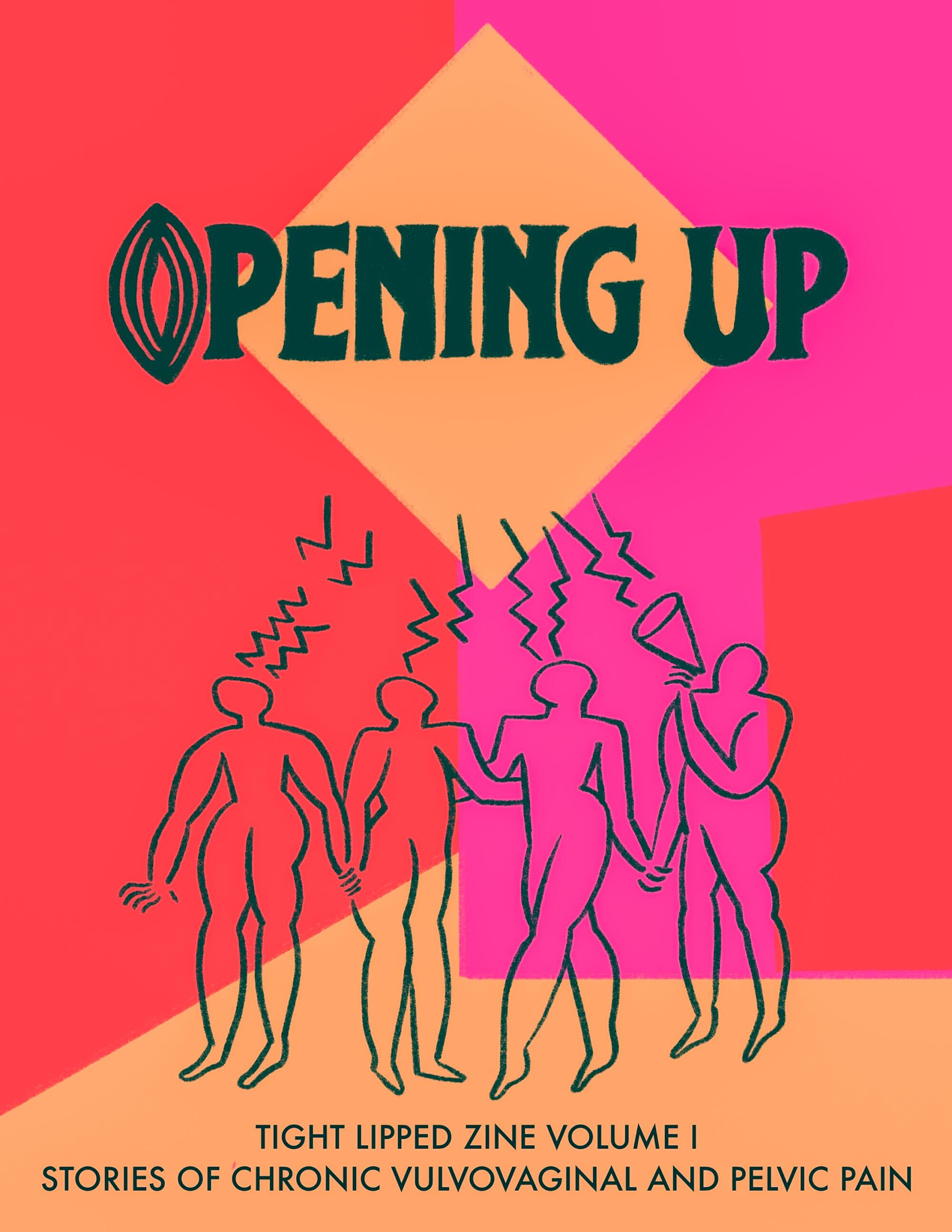
Up to 28% of women deal with these physical conditions, which affect people’s daily lives when it comes activities such as having sex, using tampons and wearing pants, according to a 2013 study published in the American Journal of Obstetrics & Gynecology that polled nearly 20,000 women. (This study doesn’t appear to be inclusive of all gender identities.)
Because these medical issues aren’t required study in most residency programs, including those for gynecologists, many patients are misdiagnosed or aren’t given a diagnosis at all from their doctor. Also, for some people, the shame and embarrassment related to having one of these conditions keeps them from seeking treatment altogether.
As a Black woman, I’m used to doctors not taking my pain seriously. But many physicians fail to see how they too can internalize racism and misogyny.
“It was the scariest thing I think I’ve ever done — ever,” Feldman said about sharing her story in the zine. She learned about Tight Lipped via its podcast and responded to a submissions call-out to contribute to the zine. But “I’m happy that people are able to feel seen and heard through this,” said Feldman, who also talks about her medical condition through her solo comedy show, “Tight: A Night of Painfully Sexy Stories” which she’s performed in small theaters around L.A.
“I think so many people just relate to it,” she said.
That was Noa Fleischacker’s hope when she and other members of the Tight Lipped community decided to create Opening Up. Since her younger years, Fleischacker, Tight Lipped’s founder and executive director, has struggled to use tampons. She also couldn’t complete pap smear exams and she found penetrative sex to be painful. She was eventually diagnosed with pelvic-floor dysfunction.
Shortly after, she launched the Tight Lipped podcast, which allows her to talk about how these conditions affect people’s relationships, gender and sexual identities, and their overall daily lives. She also formed the patient-led organization for people with similar conditions. In November 2019, she hosted a weekend-long workshop in New York for people with vulvovaginal and pelvic pain. She said hearing people’s stories inspired the zine.
“I saw what happens when you put people in a room, and they hear each other say the same things that they’ve only thought to themselves,” said Fleischacker, a former political organizer in Chicago. “So it felt like: ‘OK, we have to find a way of creating something that not just makes people feel less alone but makes people understand the kind of bigger and political story about their pain and the medical experiences that they’re having.’”
Pelvic care is experiencing a hot wellness rush, but solutions can be wildly inaccessible. “This sector is exploding right now,” says one physical therapist.
Tight Lipped used donations to make the Opening Up zine. Since publishing Opening Up, the organization has distributed more than 750 print copies of the zine to individuals and doctor’s offices. (It sells for a suggested donation of $30. A free digital version allows people to listen to the contributors read their stories.)
Opening Up features entries from more than 50 contributors of various ages and backgrounds who come from L.A., San Francisco, Seattle, Chicago, Brooklyn and Indianapolis as well Australia, Canada, France, the U.K. and Germany.

In Opening Up, there’s an entry from a 78-year-old woman, who wrote about how vulvodynia affected her marriage. Another entry tells the story of a woman who added her conditions — vulvodynia and pelvic-floor pain — to her dating app profiles to inform potential suitors. Some of the entries are anonymous, and content warnings appear on stories that discuss sensitive topics such as sexual assault.
For Kevinn Poree, 37, of New Orleans, reading the zine brought her comfort.
“I felt like, ‘Oh my God, I understand where you’re coming from,’” said Poree, who discovered Tight Lipped on social media after she was diagnosed with vaginismus and later provoked vestibulodynia (vestibule pain that occurs with pressure). “Even if you don’t necessarily have the same condition or the same symptoms, it was just so shocking and alarming that most of us have gone through the exact same experiences with providers and with stigma and dealing with friends and family and partners.”
“It was just very cathartic,” said Poree, who has since become a community member of Tight Lipped.
Doctors from Beverly Hills to Newport Beach offer “vaginal rejuvenation” to improve sex after menopause. But the treatment is risky and expensive.
It took nearly a decade and about a dozen doctors for Keena Batti, 33, of Los Angeles, to receive a diagnosis for vulvar lichen sclerosus, pelvic-floor dysfunction and hormonally mediated vestibulodynia (which causes urinary urgency and frequency as well as pain during urination and penetration). She developed the latter condition from taking birth control, she said. After reading Opening Up, she asked her pelvic-floor therapist and gynecologist if they could display the zines in their L.A. offices. They happily obliged.
After a series of unpleasant and embarrassing doctor’s visits, Batti said she wonders if having the zine sooner could’ve helped her prove to others that her “experience is not uncommon.”
“I think it’s really powerful as a patient to see a tangible example of your own experience in print,” said Batti, one of the team leaders for Tight Lipped’s L.A. chapter. (The organization has chapters in San Diego, New Haven, Conn., and New York. Additional chapters in the U.S. are expected to open this year.)
“So hopefully as we continue to distribute it, we can catch more of those people who are feeling isolated,” Batti said.
Dr. Rachel Rubin, a board-certified urologist and sexual medicine specialist, said she has seen the effect of having the zine available in her office has had on her Washington, D.C.-area patients.
“It’s really powerful and important,” said Rubin, one of a handful of physicians with training in sexual medicine for all genders, about the zine. (She completed her fellowship with Dr. Irwin Goldstein in San Diego.)
In her new book ‘The Menopause Manifesto,’ Dr. Jen Gunter wants women to know they have value beyond their immediate reproductive capability.
“We can’t know what questions need to be answered if we’re not talking to people who actually have the questions,” said Rubin, who’s also the chair of Tight Lipped’s medical advisory board of 14 health-care providers. “So it’s a no-brainer to work with [Tight Lipped] because the more the patient advocates and doctors that can work together, the more change that we’ll see faster.”
In 2022, Tight Lipped launched a campaign for OB-GYN residency programs to include vulvovaginal and pelvic pain curriculum. The organization’s first major win was at Yale School of Medicine, which will offer this area of study as an elective for residents, according to Dr. Yonghee Cho, an assistant professor of obstetrics, gynecology and reproductive sciences at the school.
Fleischacker said Tight Lipped is hoping to work with Cedars-Sinai Medical Center and USC on future curriculum.
Sarah Ponce, 25, initially planned to become a primary-care physician when she enrolled in medical school at USC in 2021. But after she was diagnosed with acquired neuroproliferative vestibulodynia (pain that begins as a severe allergic reaction to a topical medication or is stemmed from a severe yeast infection), she realized that she was most passionate about urology.
“I’ve experienced the health inequities and disparities that come with being a female with pain and I know a bunch of other patients who have too,” said Ponce, a third-year medical student at USC. She added that she wants to change that.
As a Tight Lipped organizer, she’s assisting with the group’s campaign at her school. She also has helped host free pelvic health workshops at Los Angeles General Medical Center.
Tight Lipped also wants to make change on a federal level. When President Biden announced the first White House initiative on women’s health in November, the organization sent a letter with signatures from more than 800 patients, medical students and healthcare experts to call for chronic vulvovaginal and pelvic pain to be included as a priority area of focus.
All of this gives Ponce, Feldman, Poree and others hope.
In the zine’s foreword, the creators make it clear that Opening Up isn’t just for people who are coping with these conditions. Rather they encourage people to share the publication with everyone they know including their romantic partners, doctors, high-school sex education teachers, family and friends.
“It’s going to take more than just all the patients,” Poree said. “I think that the more the general public knows about these conditions, the easier it is for people to talk about them and get directed to the help that they need.”
More to Read
Sign up for The Wild
We’ll help you find the best places to hike, bike and run, as well as the perfect silent spots for meditation and yoga.
You may occasionally receive promotional content from the Los Angeles Times.

